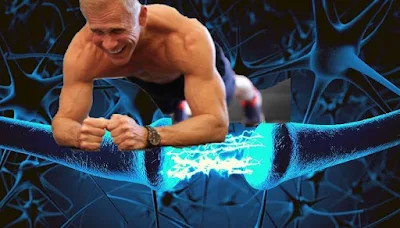C.M.S. for WUTD
Does dopamine motivate us to exercise?
Dopamine is a neurotransmitter that is frequently associated with pleasure, motivation, and reward-seeking.
Dopamine, particularly in Parkinson's Disease patients due to dopamine insufficiency, may have an impact on how people perceive physical effort, as stated by Johns Hopkins Medicine researchers.
According to a recent study, it appears to play a significant role in determining why some people find physical activity to be easy or exhausting.
This finding was reached after researching individuals who had Parkinson's disease, a condition marked by the progressive loss of dopamine-producing brain cells.
“Researchers have long been trying to understand why some people find physical effort easier than others,” says study leader Vikram Chib, Ph.D., associate professor in the Department of Biomedical Engineering at the Johns Hopkins University School of Medicine and research scientist at the Kennedy Krieger Institute.
The study suggests that the amount of dopamine availability in the brain is a key factor.
Previous studies have suggested that persons with greater dopamine are more motivated to perform physical effort for rewards.
The current study focuses on the function of dopamine in the self-assessment of the effort needed for a physical task, without the promise of a reward
The individuals' self-reports of units of effort expended were more accurate when they had taken their usual synthetic dopamine medication than when they hadn't.
When the researchers, for instance, cued them to squeeze at various levels of effort, they showed accurate squeezes with minimal effort variability.
Patients frequently over-reported their efforts when they hadn't taken the medicine, making the activity seem physically tougher, and their grips varied substantially more after being cued.
In a second experiment, patients were given a choice between taking a risk of doing different degrees of effort on a grip sensor. When the patients had taken their medication, they were more willing to take the risk and exert more effort compared to when they hadn't.
In the third experiment, participants could choose between a guaranteed sum of money or flipping a coin for a chance to get either nothing or a larger sum of money.
The results showed no difference between the patients' choices on days when they took their medicine and when they didn't.
This suggests that dopamine affects decision-making related to physical effort, but not the risk-taking decisions involving money.
The study may help to develop new strategies for enticing people to start and stick with exercise regimens.
According to researchers, it may result in new treatments for fatigue associated with depression and a variety of other diseases, as well as improve our understanding of Parkinson's disease.
Reference: “Dopamine facilitates the translation of physical exertion into assessments of effort” by Purnima Padmanabhan, Agostina Casamento-Moran, Aram Kim, Anthony J. Gonzalez, Alexander Pantelyat, Ryan T. Roemmich and Vikram S. Chib, 1 April 2023, npj Parkinson’s Disease.
DOI: 10.1038/s41531-023-00490-4
Cited in:
https://scitechdaily.com/dopamine-the-secret-ingredient-to-effortless-exercise/
Does dopamine motivate us to exercise?
Dopamine is a neurotransmitter that is frequently associated with pleasure, motivation, and reward-seeking.
Dopamine, particularly in Parkinson's Disease patients due to dopamine insufficiency, may have an impact on how people perceive physical effort, as stated by Johns Hopkins Medicine researchers.
According to a recent study, it appears to play a significant role in determining why some people find physical activity to be easy or exhausting.
This finding was reached after researching individuals who had Parkinson's disease, a condition marked by the progressive loss of dopamine-producing brain cells.
“Researchers have long been trying to understand why some people find physical effort easier than others,” says study leader Vikram Chib, Ph.D., associate professor in the Department of Biomedical Engineering at the Johns Hopkins University School of Medicine and research scientist at the Kennedy Krieger Institute.
The study suggests that the amount of dopamine availability in the brain is a key factor.
Previous studies have suggested that persons with greater dopamine are more motivated to perform physical effort for rewards.
The current study focuses on the function of dopamine in the self-assessment of the effort needed for a physical task, without the promise of a reward
The individuals' self-reports of units of effort expended were more accurate when they had taken their usual synthetic dopamine medication than when they hadn't.
When the researchers, for instance, cued them to squeeze at various levels of effort, they showed accurate squeezes with minimal effort variability.
Patients frequently over-reported their efforts when they hadn't taken the medicine, making the activity seem physically tougher, and their grips varied substantially more after being cued.
In a second experiment, patients were given a choice between taking a risk of doing different degrees of effort on a grip sensor. When the patients had taken their medication, they were more willing to take the risk and exert more effort compared to when they hadn't.
In the third experiment, participants could choose between a guaranteed sum of money or flipping a coin for a chance to get either nothing or a larger sum of money.
The results showed no difference between the patients' choices on days when they took their medicine and when they didn't.
This suggests that dopamine affects decision-making related to physical effort, but not the risk-taking decisions involving money.
The study may help to develop new strategies for enticing people to start and stick with exercise regimens.
According to researchers, it may result in new treatments for fatigue associated with depression and a variety of other diseases, as well as improve our understanding of Parkinson's disease.
Reference: “Dopamine facilitates the translation of physical exertion into assessments of effort” by Purnima Padmanabhan, Agostina Casamento-Moran, Aram Kim, Anthony J. Gonzalez, Alexander Pantelyat, Ryan T. Roemmich and Vikram S. Chib, 1 April 2023, npj Parkinson’s Disease.
DOI: 10.1038/s41531-023-00490-4
Cited in:
https://scitechdaily.com/dopamine-the-secret-ingredient-to-effortless-exercise/

Comments
Post a Comment